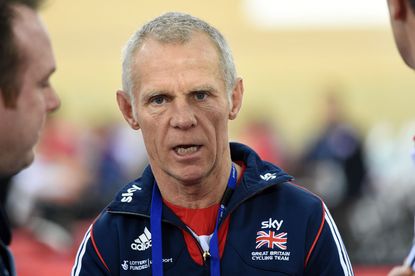We used TUEs to get marginal gains, says former Team Sky and British Cycling coach Shane Sutton
Sutton makes the comments in BBC documentary

Shane Sutton (photo: Andy Jones)

Shane Sutton has said that therapeutic use exemptions (TUEs) for corticosteroids were essentially marginal gains used to give riders an edge over opponents.
Sutton, who left Team Sky and British Cycling in April 2016 and now coaches the Chinese track team, made the comment in an interview as part of a documentary aired on BBC Two on Sunday night.
"If you've got an athlete that's 95% ready and that little 5% niggle or injury that's troubling them, if you can get the TUE to get them to 100%, of course you would in them days," Sutton said in Britain's Cycling Superheroes: the Price of Success.
"The business you're in is to give you the edge on your opponent and ultimately it's about killing them off but you definitely don't cross the line and that's something we've never done."
He was asked if "finding the gains might mean getting the TUE" and repeated the question before replying, "Yes, because the rules allow you to do that."
The airing of the documentary comes just days after UK Anti-Doping closed its 14-month investigation into the contents of a mysterious Jiffy bag delivered to Team Sky at the 2011 Critérium du Dauphiné. UKAD neither cleared nor condemned those involved, with a lack of medical records meaning that it was unable to determine what was in the Jiffy bag.
Get The Leadout Newsletter
The latest race content, interviews, features, reviews and expert buying guides, direct to your inbox!
Attention rose after Russian hacker Fancy Bears released medical data on Olympic athletes including 2012 Tour de France winner Bradley Wiggins. It showed the team requested and received permission to treat Wiggins with triamcinolone, a corticosteroid, for his allergies ahead of the 2011 and 2012 Tours, and 2013 Giro d'Italia.
>>> British Cycling threatened with loss of funding if there's any repeat of 'Jiffy bag' case
Wiggins said in an earlier interview that he had a "history of allergy to pollen." He felt like he was "breathing through a straw at times."
Former professional rider David Millar has previously said that he had received a TUE to take triamcinolone for a "fake tendon issue", enabling him to lose weight without losing power, and said that Team Sky were "gaming the system" with their use of TUEs.
"I think that's quite obvious. I think we all know that. It's just hugely disappointing," Millar explained to BBC.
"Team Sky were zero tolerance, so you would think that zero tolerance would mean you weren't going to tread into that very grey area which is cortisone use. When I heard that, a little bit of me died to be honest."
>>> Bradley Wiggins 'breaks silence' and requests source of 'Jiffy bag' allegation
Sutton's "worrying" comments left World Anti-Doping Agency president Craig Reedie "extremely disappointed."
"Because the TUE system recognises accurate and responsible medical evidence. It's designed to help athletes who have illnesses and conditions to be able to take, under proper medical advice, substances which are on the prohibited list to take part in sport," Reedie told The Times.
"The inference is that the system can be used and that's the worrying thing if someone is seeking to do that."

Thank you for reading 20 articles this month* Join now for unlimited access
Enjoy your first month for just £1 / $1 / €1
*Read 5 free articles per month without a subscription

Join now for unlimited access
Try first month for just £1 / $1 / €1
Gregor Brown is an experienced cycling journalist, based in Florence, Italy. He has covered races all over the world for over a decade - following the Giro, Tour de France, and every major race since 2006. His love of cycling began with freestyle and BMX, before the 1998 Tour de France led him to a deep appreciation of the road racing season.
-
 Top 5 five U.S. cities with the most bike commuters revealed
Top 5 five U.S. cities with the most bike commuters revealedAccording to new research from DesignRush, Corvallis, Oregon, has the highest percentage of workers that regularly commute to work by bike.
By Kristin Jenny Published
-
 ENVE Composites under new ownership: private Utah investment firm takes the wheel
ENVE Composites under new ownership: private Utah investment firm takes the wheelAmer Sports, the parent company of Enve Composites, announced today that the Enve brand has been acquired by PV3, a Utah-based private investment firm allegedly owned by avid cyclists.
By Anne-Marije Rook Published
-
 Shane Sutton calls for Bradley Wiggins and Dr Richard Freeman to 'come forward and tell the truth'
Shane Sutton calls for Bradley Wiggins and Dr Richard Freeman to 'come forward and tell the truth'Former Team Sky coach Shane Sutton urges Bradley Wiggins and Dr Richard Freeman to give an account of the use of corticosteroid triamcinolone
By Nigel Wynn Published
-
 GB riders attack Shane Sutton over claims that TUEs can be used to find marginal gains
GB riders attack Shane Sutton over claims that TUEs can be used to find marginal gainsGreat Britain riders have reacted with anger to claims by Shane Sutton that TUEs can be legitimately used to find an edge over rivals.
By Henry Robertshaw Published
-
 Shane Sutton: 'I was loved by the staff' at British Cycling
Shane Sutton: 'I was loved by the staff' at British CyclingFormer British Cycling technical director Shane Sutton defends his reputation during interview at the Manchester Track Word Cup
By Nigel Wynn Published
-
 Shane Sutton will be 'decked out' in China colours at Manchester Track World Cup
Shane Sutton will be 'decked out' in China colours at Manchester Track World CupFormer British Cycling technical director Shane Sutton returns to Manchester for the UCI Track World Cup as the new coach for the Chinese team
By Nigel Wynn Published
-
 Shane Sutton still welcome to work with British Cycling riders, says new performance boss
Shane Sutton still welcome to work with British Cycling riders, says new performance bossBritish Cycling's former technical director is still welcome to work with its riders, according to the organisations incoming performance director.
By Henry Robertshaw Published
-
 Jess Varnish still battling to get full report into sexism complaints from British Cycling
Jess Varnish still battling to get full report into sexism complaints from British CyclingTrack sprinter’s lawyer blasts lack of transparency at governing body
By Vern Pitt Published
-
 Seven questions that Team Sky and British Cycling still need to answer
Seven questions that Team Sky and British Cycling still need to answerDespite four hours of select committee grilling, there are still plenty of question that we'd like to see answered by Team Sky and British Cycling bosses
By Henry Robertshaw Published
-
 Shane Sutton tells MPs how he 'arranged' for delivery of Dauphiné package
Shane Sutton tells MPs how he 'arranged' for delivery of Dauphiné packageFormer Team Sky head coach Shane Sutton has told MPs how he arranged for the delivery of a mystery package that has been the centre of recent controversy.
By Henry Robertshaw Published